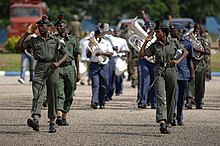Nigerian Army Band Corps
| Nigerian Army Band Corps | |
|---|---|
 Drum majors from the NABC during the Africa Endeavor 2008 opening ceremony. | |
| Active | 1932 - present |
| Country | |
| Branch | |
| Type | Military Band |
| Role |
|
| Part of | Directorate of Music |
| Headquarters | Ojuelegba, Lagos, Nigeria |
| Nickname(s) | NABC |
| Commanders | |
| Director of Music | Colonel O.G. Olaniyi[1] |
The Nigerian Army Band Corps (NABC) is the official military band of the Nigerian Army. It was founded as a regimental band in 1932, with Captain J. Cooper from the Royal Life Guards Band in London originally leading the band. In 1935, the NABC was converted into a full-fledged military band, being part of the Royal West African Frontier Force (RWAFF). Two years before the country's independence in 1960, the band was transferred from its rehearsal space in Kaduna to Abalti Barracks in Lagos. As part of the government policy of the replacement British citizens with native Nigerians in public roles, Captain Cooper was replaced in 1964 by Lieutenant Colonel Josef Olubobokun (1930–2015), who became the first native Nigerian to lead the band.[2][3][4] During his tenure, he would become instrumental in the establishment of institutions such as the Nigerian Army School of Music.[5][6]
Characteristics
Instrumentation
Musical accompaniment provided by band ranges from jazz and traditional music to military and classical music.[7]
Requirements
It order to be eligible to serve in the band, one would have to be aged between 18 and 26, as well as have a height of 168 cm (5 ft 6 in) for male members (162 cm (5 ft 4 in) for female members) and a knowledge of Nigerian regional languages, aside from capability in playing musical instruments.[8]
Directors of Music
- Captain J. Cooper (1932-1964)
- Lieutenant Colonel Josef Olubobokun (1964-16 January 1984)[9]
- Lieutenant Colonel A.G. Ugwunze (16 January 1984-)[10]
- Colonel O.G. Olaniyi (11 February 2019-Present)[11][12]
See also
References
- ^ https://www.premiumtimesng.com/news/headlines/311713-shakeup-in-nigerian-army-new-spokespersons-appointed.html
- ^ "Corps & Services - Nigerian Army- Official Website". www.army.mil.ng.
- ^ https://ngvotes.com/nigerian-army-band-corps-nabc/
- ^ Collier, Gordon (2012). Focus on Nigeria: Literature and Culture. ISBN 9401208476.
- ^ http://ugspace.ug.edu.gh/handle/123456789/2709
- ^ https://www.ajol.info/index.php/rrias/article/view/22966
- ^ "Band Of The Nigerian Army - Fanfares". Discogs.
- ^ "2018 Nigerian Army Recruitment: Musicians for Nigerian Army Band Corps".
- ^ https://www.pressreader.com/nigeria/thisday/20151225/282299614133652
- ^ https://books.google.com/books?id=A7SfvCQGd54C&q=Nigerian+Army+Band+Corps&dq=Nigerian+Army+Band+Corps&hl=en&sa=X&ved=0ahUKEwiE0fetkt_mAhWQbc0KHeHZCXAQ6AEILzAB
- ^ https://m.guardian.ng/news/army-gets-new-spokesman-releases-new-posting/
- ^ https://punchng.com/army-gets-new-spokesman-others/amp/
